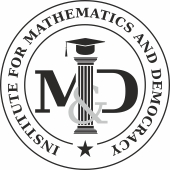GENERAL, FREE RESOURCES
- Optimized Democracy, a graduate course taught remotely by Ariel Procaccia at Harvard
- All lecture recordings are freely available here
- some probability theory & algorithms background needed
- Trends in Computational Social Choice, published by AI Access
- textbook available electronically for free and in hardcopy at close to production cost (non-profit publisher)
INTRODUCTORY & SURVEY PAPERS
- Mathematical voting theory:
- A Mathematical View on Voting and Power | Werner Kirsch
- Math and Voting: Voting Methods, Fair Representation, and the Electoral College | Sarah Nelson
- Computational social choice:
- Quantification of power (also covered under mathematical voting theory):
- Liquid democracy:
- Gerrymandering:
ALGORITHMS
- Key topics: parameterized algorithms, randomized algorithms, computational complexity, probability, algorithmic game theory
- Voting systems & social choice functions:
- Election Manipulation: There are a number of forms of election manipulation that can be modeled algorithmically and are fixed-parameter tractable (i.e. they may originally be NP-hard but become tractable when we fix a parameter to a constant). These include strategic voting (voting against one’s true preferences to prevent an undesirable outcome) and bribery.
- Liquid Democracy: Liquid democracy is a collective-decision making system that combines elements of direct and representative democracy. An individual can choose to either vote directly on a specific issue or delegate their vote to someone else, and delegated votes are transitive. Liquid democracy models require a central delegation mechanism, creating a growing area of research in algorithms and probability.
- Liquid democracy lecture (February 10) from Ariel Procaccia’s Harvard graduate course, Optimized Democracy
- An Overview of Ten Years of Liquid Democracy Research
- Liquid Democracy: An Algorithmic Perspective
- Gerrymandering: Gerrymandering is the practice of redrawing electoral districts in a manner that creates an advantage for a political party. Algorithmic approaches to the study of gerrymandering include algorithms for detection of gerrymandering, algorithms to undo gerrymandering based on specified mathematical goals, and models of gerrymandering over graphs.
- Antimander: Open Source Detection of Gerrymandering though Multi-Objective Evolutionary Algorithms
- On theoretical and empirical algorithmic analysis of the efficiency gap measure in partisan gerrymandering
- Prior reading on the efficiency gap measure for gerrymandering: A Formula Goes to Court: Partisan Gerrymandering and the Efficiency Gap
- Gerrymandering on Graphs: Computational Complexity and Parameterized Algorithms
COMPUTATIONAL SOCIAL CHOICE:
- Computational complexity in ComSoc:
GAME THEORY
- Optimizing voting systems:
GENERAL MATHEMATICS:
- Gerrymandering: Gerrymandering is the practice of redrawing electoral districts in a manner that creates an advantage for a political party. There are some general mathematical tools that can be used to identify and measure gerrymandering.
GEOMETRY
- Gerrymandering: Gerrymandering is the practice of redrawing electoral districts in a manner that creates an advantage for a political party. This creates an area of research in the analysis of the shapes and compactness of districts.
NETWORKS & GRAPH THEORY
- Political networks, coalitions, and collaboration:
- Detecting coalitions by optimally partitioning signed networks of political collaboration
- Identifying hidden coalitions in the US House of Representatives by optimally partitioning signed networks based on generalized balance
- A Local Structure Graph Model: Modeling Formation of Network Edges as a Function of Other Edges
- Gerrymandering over graphs: Gerrymandering, the practice of redrawing electoral districts in a manner that creates an advantage for a political party, can be modeled over graphs.
TOPOLOGY
- Political structures, coalitions, and collaborations: Topological methods, particularly simplicial complexes, can be used to model political structures, such as structures of voting collaboration in a government body, as well as their changes over time.
- Gerrymandering: Gerrymandering is the practice of redrawing electoral districts in a manner that creates an advantage for a political party.
Here are some further links to journals that are friendly to research in the intersection of math and politics:


